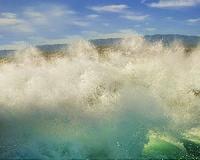| . |  |
. |
Baltimore MD (SPX) May 04, 2011 Global climate change is anticipated to bring more extreme weather phenomena such as heat waves that could impact human health in the coming decades. An analysis led by researchers at the Johns Hopkins Bloomberg School of Public Health calculated that the city of Chicago could experience between 166 and 2,217 excess deaths per year attributable to heat waves using three different climate change scenarios for the final decades of the 21st century. The study was published May 1 edition of the journal Environmental Health Perspectives. "Our study looks to quantify the impact of increased heat waves on human mortality. For major a U.S. city like Chicago, the impact will likely be profound and potentially devastating," said Roger Peng, PhD, lead author of the study and associate professor in the Department of Biostatistics at the Bloomberg School of Public Health. "We would expect the impact to be less severe with mitigation efforts including lowering CO2 emissions." For the analysis, Peng and his colleagues developed three climate change scenarios for 2081 to 2100. The scenarios were based on estimates from seven global climate change models and from mortality and air pollution data for the city of Chicago from 1987 to 2005. The data were limited to the warm season from May to October of each year. From 1987 to 2005, Chicago experienced 14 heat waves lasting an average of 9.2 days, which resulted in an estimated 53 excess deaths per year. In the future, the researchers calculated that excess mortality attributable to heat waves to range from 166 to 2,217 per year. According to the researchers, the projections of excess deaths could not be explained by projected increases in city population alone. The exact change due to global warming in annual mortality projections, however, is sensitive to the choice of climate model used in analysis. "It's very difficult to make predictions, but given what we know now-absent any form of adaptation or mitigation-our study shows that climate change will exacerbate the health impact of heat waves across a range of plausible future scenarios," added Peng. Authors of "Towards a Quantitative Estimate of Future Heat Wave Mortality Under Global Climate Change" include Jennifer F. Bobb of the Bloomberg School of Public Health, Claudia Tebaldi of the University of British Columbia, Larry McDaniel of the National Center for Atmospheric Research, Michelle L. Bell of Yale University and Francesca Dominici of Harvard School of Public Health.
Share This Article With Planet Earth
Related Links Johns Hopkins Climate Science News - Modeling, Mitigation Adaptation
 The case for climate change
The case for climate changePasadena CA (JPL) May 03, 2011 NASA's Jet Propulsion Laboratory and the U.K. Meterological (Met) Office are combining forces - bringing together the expertise of observing Earth from space on the one hand, and the expertise of developing climate and weather models and forecasting on the other. Professor Julia Slingo OBE, Chief Scientist of the U.K. Meteorological Office, recently visited JPL and gave us her perspective on cli ... read more |
|
| The content herein, unless otherwise known to be public domain, are Copyright 1995-2010 - SpaceDaily. AFP and UPI Wire Stories are copyright Agence France-Presse and United Press International. ESA Portal Reports are copyright European Space Agency. All NASA sourced material is public domain. Additional copyrights may apply in whole or part to other bona fide parties. Advertising does not imply endorsement,agreement or approval of any opinions, statements or information provided by SpaceDaily on any Web page published or hosted by SpaceDaily. Privacy Statement |